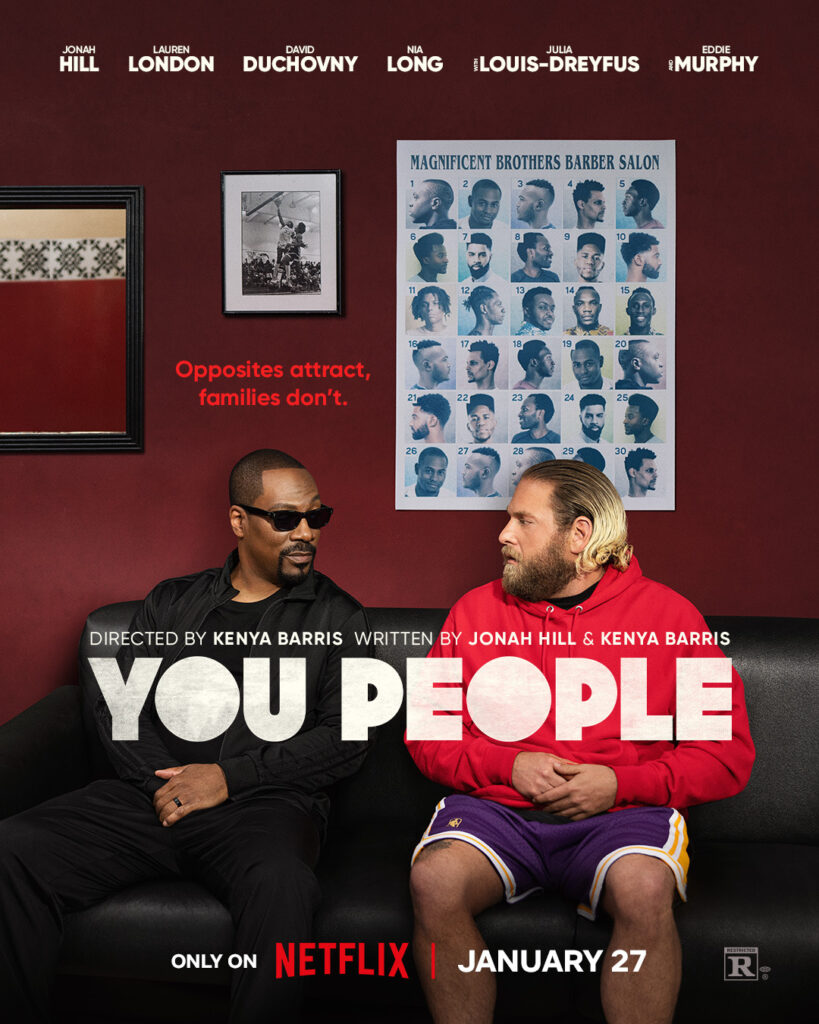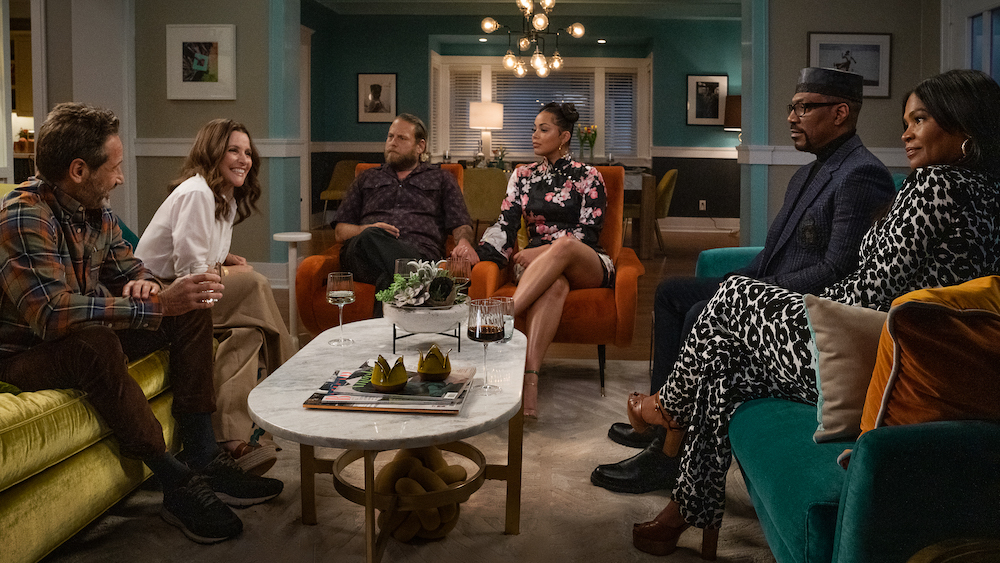Genre: Comedy
Premise: A white Jewish accountant falls in love with a black clothing designer and the two must deal with their parents’ unique perspectives on their relationship.
About: Kenya Barris, the creator of Black-ish, is finally getting into the feature film game with this script he wrote with Jonah Hill. The movie premiered on Netflix this Friday. The film has a killer cast. Jonah Hill, Eddie Murphy, Julia-Louise Deyfuss, David Duchovny.
Writer: Kenya Barris and Jonah Hill
Details: 2 hours long

COMEDY!
They say it’s dead.
At least at the box office.
But maybe not at the streaming office.
This is one I’ve been looking forward to since I saw the trailer, which I thought was great. I loved the casting. Fun premise. What could go wrong?
Ezra is a 35 year old Jewish accountant who hates his job. The only respite he gets from it is through the podcast he shares with his black lesbian plus-sized best friend who he discusses black culture with. In Ezra’s dream world, he would quit his job and podcast full time.
But first Ezra would like to fix his love life, or, I should say, his lack of one. Although the Jewish community fixes Ezra up with a lot of girls, he can’t seem to find one that he vibes with.
Then, one day, after work, he gets in an Uber that isn’t his Uber, which is where he meets Amira, a young black fashion designer. Amira is angry that Ezra would get in her car, assuming she must be an Uber driver because she’s black, until he shows her the picture of his driver, who she admits looks exactly like her.
The two start joking around and, before we know it, they’re dating! Months pass, Ezra is head over heels. So he asks her to marry him. She’s totally down but before that can happen, they must meet the parents.
First, Ezra meets Akbar and Fatima, Amira’s parents, and right away there are issues. Neither of them like the fact that their black daughter is marrying a white man, particularly a Jew, with Akbar leading the charge. When Ezra asks Akbar for his blessing, Akbar simply says, “If you want to marry my daughter, you can try.”
Ezra’s parents are the opposite. They are beyond excited that they are about to up their “progressive” street cred. Ezra’s mom, Shelley, is particularly thrilled that she will have half-black grandchildren. Shelley and Arnold (Ezra’s dad) start to creep Amira out with just how much they love her blackness.
Things get even crazier when the parents have to meet EACH OTHER. Right away, they’re debating who had it worse, slaves or Holocaust survivors. And now we’re off to the races. The friction gets so intense that maybe it’s going to prevent Ezra and Amira from living happily ever after. Ultimately, the couple will have to decide what’s more important, their happiness or their families’ approval.
I have never experienced a Kenya Barris production before. And after watching this, I’m on the fence whether I’ll do so again.
It’s not that You People is bad. It’s that it’s frustratingly uneven.
At times it’s cheesy. Other times it’s awkward. And at certain times it feels so much like a sitcom that I forgot I was watching a movie. There is one scene where there are 6 chairs set up in a perfect U-shape and every character is sitting in a chair and they have one long conversation. No movement at all. Just people on a set saying their lines. It truly felt like Barris was learning on the job.

Luckily, the script works well whenever it’s leaning into its concept, an interracial couple facing both overly skeptical and overly accepting parents. Ezra’s attempt to get to know Amira’s parents by scheduling a meeting at Roscoe’s Chicken and Waffles (a popular black eatery in Los Angeles) was pretty darn funny.
But my favorite scene was Amira meeting Ezra’s parents. Shelley’s intense desire to impress Amira with how much she loves black people was hilarious. And Arnold’s bizarre obsession with his favorite rapper as a teenager, Xhibit, begins one of the best running gags in the movie.
I think my favorite joke was when Ezra left the room to calm his mother down only to come back to find Arnold [badly] serenading Amira on the piano, which he clearly never used until this moment.
Unfortunately, whenever the movie moves away from that premise, it falls apart. The ‘falling in love’ scenes, in particular, are hard to watch. I struggle to think of a more inauthentic example of two people falling in love. From cheesy R&B tunes to 1980s dissolves to some pretty lousy “I love you, no I love you” dialogue.
One thing that stuck out to me as a considerable blemish on the film was Ezra’s dream to become a professional podcaster. He has this podcasting partnership with a black lesbian (or potentially non-binary person?) that felt about as authentic as Kanye West running a self-help seminar.
Nothing about their partnership rang true. You didn’t buy into their friendship. You knew there wasn’t any scenario by which Ezra would’ve ever met this woman. The only reason it existed is because the writer wanted it to. And when you, as the writer, prioritize your ‘wants’ over writing the actual truth, that’s when the pillars holding your script up start to splinter.
Worse, turning this podcast into a profession as opposed to a hobby didn’t seem representative of the character at all. Ezra didn’t appear to have any other black people in his life before Amira arrived. Based on his friend group we meet later at the bachelor party, he hung out in exclusively white circles. So why was he interested in black culture to the point where he went out and found a black non-binary podcasting partner to talk about black culture??
Why am I getting all nerdy about this? Because you never want to force things into your story to begin with. But you especially don’t want to do it in comedy, where you’re avoiding anything that can restrict the oxygen breathing air into your comedy. Forced storylines and the exposition that comes with them can inject a clunkiness into scenes that then becomes the dominant attribute we’re noticing.
Which is exactly what happens here. Every time Seth’s talking to his podcasting partner, all we’re thinking is, “These two have no chemistry. Where did they meet and why are they friends? Their podcast is lame. There’s no future in this.” And if we’re thinking about that, guess what? We’re not laughing.
Hollywood’s been getting character jobs and character job motivations wrong for decades. The main reason for this is that writers never have real jobs. So they have no idea how the real world works. This leads to them giving characters jobs *they would like to have* or whatever job is hot at the moment (why so many 80s characters in rom-com scripts were architects).
This is why, of course, Seth is a podcaster. Because everybody’s a podcaster these days. It’s “relevant.” I cannot emphasize enough that this is not how you should choose your hero’s job. Your character’s job (as well as whatever dream job they might want to quit their current job for) should always stem from who *your character* is, not from who *you* are.
With comedy, you have two options. One is to lean exactly into who your character is. Two is to give them an ironic job. So let’s say your character is an overly relaxed person who’s good with people. He could be a therapist. Or, if you wanted to be ironic, he could be a chef at a very intense kitchen where he’s screaming all day. But what he wouldn’t be is a bitcoin market analyst, aka some random trendy job that doesn’t match his character at all.
They say comedy is reacting and both Joanh Hill and Lauren London’s reactions are probably the best thing about this film. Julia Louise Dreyfuss’s Shelley wants so desperately to be accepted by the black community that she is constantly over-stepping and saying stupid stuff. At one point, after learning that many black women wear wigs, she does some research so that the next time she sees Amira, she can say, “I love your hair. It’s so pretty.” “Thanks.” “Is that a roller set?” The look on Amira’s face as she stares back at her is just priceless.
But the best is Ezra listening to his mom and dad try to sound hip when he first brings Amira around. Arnold, for reasons that nobody understands, starts to share his love for Xhibit, a rapper from the late 90s, the last time he listened to rap. Watching Ezra fall apart as his dad goes further and further down the Xhibit rabbit hole was one of my favorite parts of the movie.
I hate grading on a curve but I feel like the world of comedy has fallen so drastically that we’re lucky when we get a comedy that even kind of works. Which is how I’d categorize You People. It kind of works. And it did make me laugh out loud over a dozen times. That’s something, right? So, if you’re looking for a little cheer-up, this movie will probably do the trick.
[ ] What the hell did I just watch?
[ ] wasn’t for me
[x] worth the stream
[ ] impressive
[ ] genius
What I learned: When you have a good concept, structure as many scenes around that concept as possible. You People is best when the characters are around their parents. That’s where all the conflict and fun is. It’s at its worst in almost every other scene.

